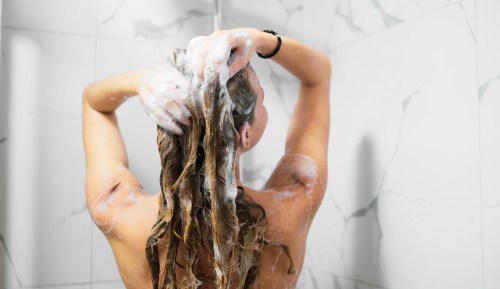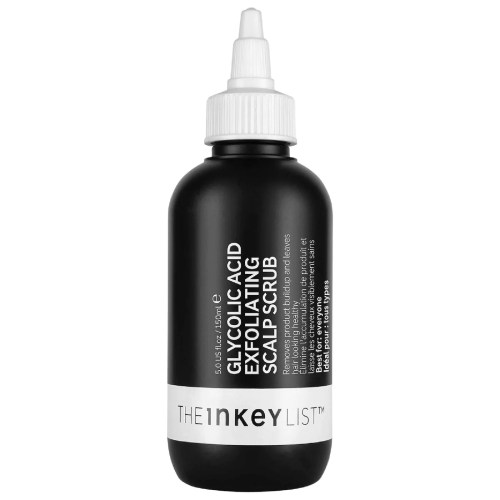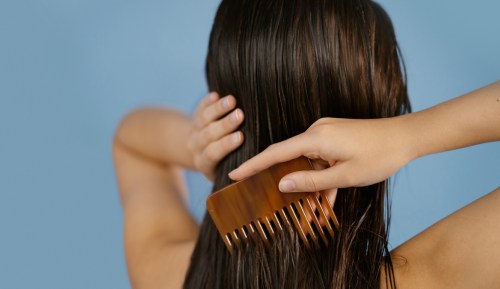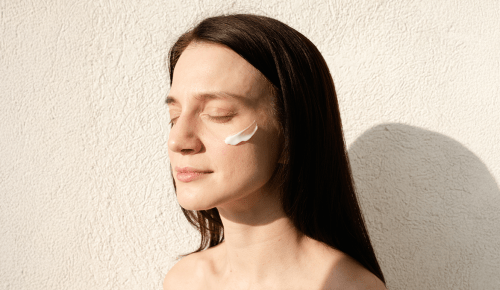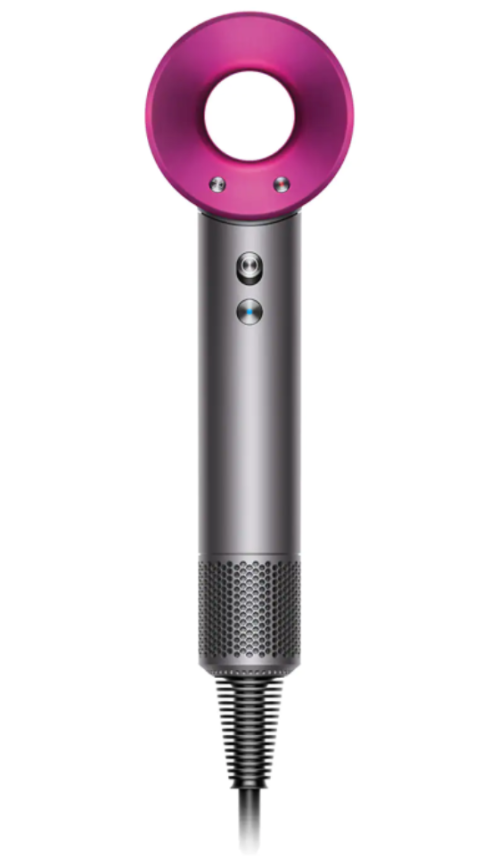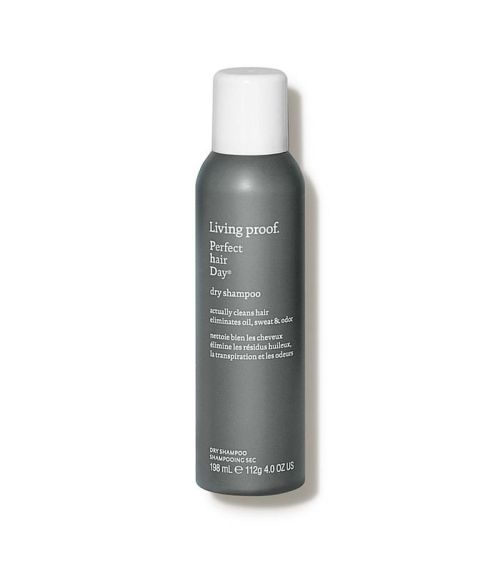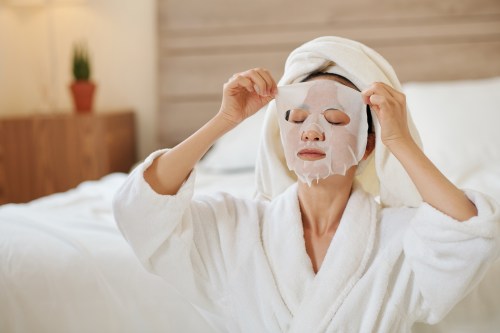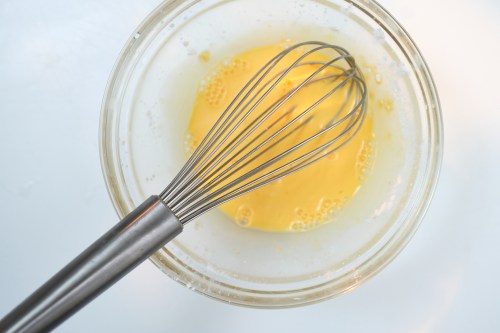Our editors independently select these products. Making a purchase through our links may earn Well+Good a commission
Something we all learn at a young age: good hygiene calls for regular bathing. But the lines tend to blur when it comes to hair washing. Shower caps exist for a reason, after all— so are we meant to shower daily and reserve our shampoos for just once a week? Twice a week? More?
Logically, you would think that the more often you wash your hair, the healthier and better it will be—but that’s not always the case. Of course, there is a camp that stands by the need for lathering daily, but these days it seems like most people are seeking the bragging rights that come with how long they can go between washes. And when someone does proclaim that they only wash their hair once a week (or even less), they tend to earn praise from their hairstylist and become the envy of their friends. Which brings us to the question du jour: Why can’t anyone agree with how often our hair needs to be washed?
In an attempt to answer this common beauty conundrum once and for all, we asked a hairstylist, a colorist, a dermatologist, and a trichologist to share their expert opinions—and it turns out there is no one-size-fits-all answer. “There is no singular rule for recommended hair washing frequency,” says Shab Caspara, a trichologist and hair expert.
For the most part, hairstylists and colorists will err on the side of washing less, with once or twice a week being enough because the physical hair and color tend to look and style better that way. From a clinical perspective, though, dermatologists and trichologists will say that more frequent washes are better, as their focus is primarily on the scalp and they want to encourage people to keep it clean and healthy.
“Most commonly, I find patients need to wash their hair one to three times per week,” says Tiffany Libby, MD, a board-certified dermatologist at Brown University. She explains that where you fall on that spectrum is largely dependent on four main factors. Keep reading to find out exactly what those are, and how you can use them to find your very own shampoo magic number.
The ‘Big 4’ factors that determine how often you should be washing your hair
1. Hair type and texture
Those with coily, coarse, or curly hair require fewer weekly washes because these hair types need to hold onto as much oil as possible in order to stay properly moisturized. One wash a week, or even every 10 days, should do the trick (though keep in mind that some of the other factors listed below may up that number). On the flip side, those with pin-straight or very fine hair require more frequent washing, because even the tiniest bit of oil left on the scalp or added in via product can turn into a greasy situation very quickly. You may need to wash these textures every day or every other day, and if that’s the case, be sure to use a gentle shampoo that won’t strip your hair.
2. Scalp oiliness
If your scalp tends to get oily easily, you may need to wash your hair more frequently, says Caspara. That’s not to say that every day is a must, though. “Washing your hair every other day is an ideal approach,” she says, and recommends implementing products with glycolic acid, which can help temper an overproduction of oil. She likes The INKEY List’s Glycolic Acid Exfoliating Scalp Scrub ($13).
It’s worth noting that your oil levels may change from season to season and year to year, which means you’ll need to adjust your hair-washing habits accordingly. “In the summer months, you may need to increase the frequency of washing your hair, but may then need to decrease that frequency in the colder, drier months,” says Dr. Libby. Additionally, you may remember from skin-care 101 that our bodies tend to produce less oil as we age, so those who previously dealt with oily scalps may notice they don’t need to wash their hair as much as they get older.
The INKEY List Glycolic Acid Exfoliating Scalp Scrub — $13.00
3. Activity levels
Some experts will say that every time you sweat, you should wash your hair, but the four that we spoke to were not as adamant—it came down to more of a preference thing. Dr. Libby says that if you choose to wash your hair every day, you can, but Adam Reed, a professional hairdresser and founder of ARKIVE Headcare, says you really don’t need to. Personally, I exercise daily and rely on my Dyson dryer’s cool setting to make my sweat disappear post-workout.
When it comes to dry shampoo—aka everyone’s post-workout beauty BFF—remember that it can be “a quick fix for absorbing oil on your hair and scalp,” but “doesn’t replace shampooing and certainly does not clean the scalp,” says Dr. Libby. So while it’s totally okay to use it between washes, you want to be sure you’re taking precautions to avoid buildup, which can clog your follicles and create a whole host of issues for your hair, like thinning and oiliness. Reed recommends starting with dry shampoo before you actually need it (ideally on second-day strands) so you aren’t piling it onto hair that’s already super greasy, and spraying it onto a brush instead of directly onto your scalp and roots. “Brushing helps to moisturize the hair [with the oils from the scalp] and to maintain volume and body,” he explains. Finally, if you’re an avid user, it’s important to thoroughly scrub your scalp every time you use an actual shampoo.
Dyson Supersonic™ Hair Dryer — $429.00
Newsflash: You Can Wash Your Hair Every Day, According to This Haircare Brand Founder

Scarlett Johansson’s Morning Skincare Routine Is All About Simplicity—Here’s How She Starts Her Days Out Right
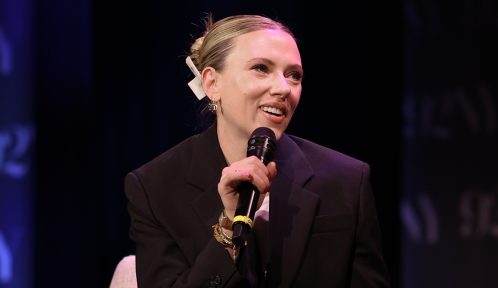
Tons of Elizabeth Arden Skincare Finds Are on Major Sale at Walmart Right Now—Here’s What a Dermatologist Is Eyeing
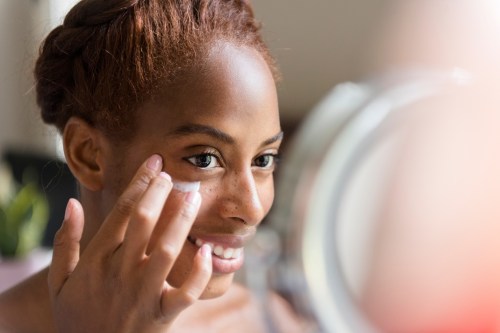
Living Proof Perfect Hair Day Shampoo — $32.00
4. Hair color
“Overshampooing your hair is the number one way to fade out your color,” warns Justin Anderson, a celebrity hair colorist and co-founder of dpHUE. “It also contributes to dullness and strips away essential oils that your hair and scalp actually need.”
Reed agrees, saying that chemically colored hair has been treated in a way that changes the hair’s tone, which can be washed away by frequent shampoo sessions. For these reasons, Anderson says that shampooing once or twice a week is plenty and recommends the ACV Hair Rinse ($37) from his line as a shampoo replacement for days that you still may want to “wash,” just sans suds. It’s great for removing product build-up on the scalp, too, which is a concern that Caspara encourages everyone to keep in mind.
How to tell if you’re over (or under) washing
To determine whether you’ve hit your Goldilocks number of weekly washes (aka gotten it “just right”), pay attention to how your hair is reacting. Scalp inflammation, dryness, and flaking as well as dull-looking strands are all signs of overwashing; while thinning, dandruff, and itching are signs you need to shampoo more often.
Since balance is key here, there are a few routine tweaks you can make if you need to cut down on weekly washes… which start with, quite literally, cutting down on weekly washes. According to Reed, shampooing every day can strip the hair’s natural oils, which triggers the scalp’s sebaceous glands to produce oil, making your hair look greasier more quickly. He explains that when you reduce your washes, your hair won’t need to produce as much oil, and it will give the glands a chance to rebalance themselves. Another thing to quit: touching your hair, especially your scalp, as that can lead to excess oil production, too.
All’s to say: when it comes to how often you should shampoo, do what’s right for you. Follow the guidelines above and take cues from your scalp and strands—when they tell you they need a wash (or not!), you’re going to want to listen.
Sign Up for Our Daily Newsletter
Get all the latest in wellness, trends, food, fitness, beauty, and more delivered right to your inbox.
Got it, you've been added to our email list.
